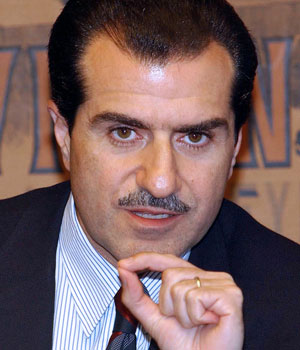
Undated photo shows anti-Syrian newspaper boss and lawmaker Gebran Tueni. Tueni was killed 12 December 2005 in a massive car bombing in a Beirut suburb the latest in a wave of attacks targeting critics of Damascus (AFP)
BEIRUT,(Reuters) – Schools, shops and businesses closed down in Lebanon on Tuesday to mourn anti-Syrian journalist and legislator Gebran Tueni, whose killing threatened to plunge the country into political turmoil.
Tueni was killed on Monday by a large car bomb explosion in a Christian suburb of Beirut along with three other people in the third political assassination since former Prime Minister Rafik al-Hariri was killed in February.
"Gebran Tueni did not die, an-Nahar carries on," said the frontpage banner headline of Beirut””s leading Arabic-language an-Nahar newspaper, published by Tueni.
The 48-year-old Tueni””s most fiery criticism of Syria and its role in Lebanon often came in weekly editorials splashed across the newspaper””s front page.
Many Lebanese politicians blamed Syria for Tueni””s murder but Damascus was quick to deny any involvement. The killing, however, strained the domestic political scene where Syria still has powerful allies.
"Enough…," was the headline of al-Bayrak daily.
Other newspapers were more blunt: "The Syrian security regime assassinates Gebran Tueni," al-Mustaqbal paper headlined.
Five Shi””ite Muslim ministers close to Syria suspended participation in the government after it voted on Monday nightto seek a U.N. investigation into a series of assassinations that have rocked Lebanon over the past 14 months.
A sixth Christian minister loyal to pro-Syrian President Emile Lahoud also walked out of the session.
The Shi””ite ministers, all loyal to Hizbollah and Amal groups, opposed the call for a U.N. inquiry into the killing of Tueni and others, but were outvoted by ministers who campaigned with Tueni for Syria to withdraw its troops from Lebanon in April after 29 years.
The government also called on the United Nations to form a tribunal of an "international character" to try suspects in the killing of Hariri.
FRESH EVIDENCE
Hours after Tueni””s murder, a U.N. inquiry team said in an interim report that it had fresh evidence to reinforce earlier findings of Syrian involvement in Hariri””s murder and that Damascus had hindered the investigation.
The report to the U.N. Security Council by German prosecutor Detlev Mehlis also said Syria had burned some papers relating to Lebanon and pressured one witness to recant his testimony.
It said there were 19 suspects, whom it did not identify, including five Syrians questioned by U.N. investigators in Vienna this month.
The 15-member Council weighs its response to Mehlis””s report at a meeting later on Tuesday.
The Security Council and U.N. Secretary-General Kofi Annan condemned Tueni””s killing and said his killers had to be brought to justice.
France indicated it would be willing to expand the investigation to include others who had been killed in Lebanon, including Tueni.
U.S. President George W. Bush condemned the killing, praising Tueni for bravery in trying to promote freedom. He urged Damascus to comply with U.N. resolutions and end "its interference in Lebanon once and for all."
Lebanon has detained four pro-Syrian generals but the U.N. report said the probe, expiring this month, needed more time.
Tueni, a fierce critic of Syria””s policies in Lebanon who was elected to parliament this year, said in August he believed he was on a hit list for assassination. He had spent much of his time since then in Paris, but returned to Beirut late Sunday.

Siham Tueni, widow of slain Lebanese leading anti-Syrian journalist and MP Gebran Tueni, reacts at the site of the bomb explosion that targeted the car of her husband in Beirut’s Mkalles Christian suburb, 12 December 2005 (AFP)

Young supporters of the Christian Lebanese Forces militia mourn the death of Lebanon’s prominent anti-Syrian MP and newspaper boss Gebran Tueni (portrait R) in Beirut 12 December 2005 (AFP)

Lebanese mourners carry the coffin of slain Gebran Tueni outside a hospital in Beirut December 12, 2005 (REUTERS)
